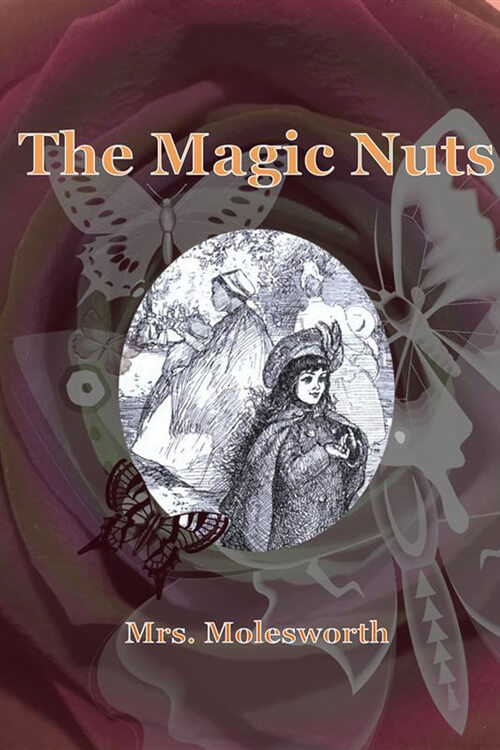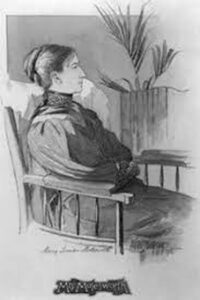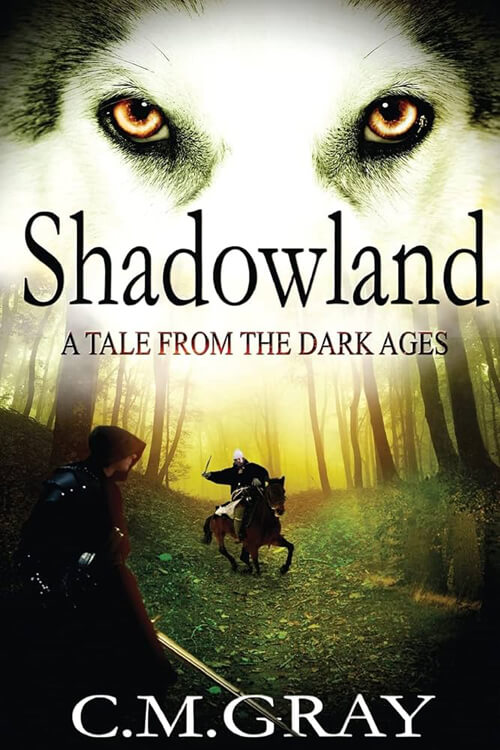
The Magic Nuts
Little Leonore pressed her face against the window of the railway carriage and tried hard to see out. But it was no use. It all looked so dark and black, all the darker and blacker for the glimmer of the raindrops trickling down thickly outside, and reflecting the feeble light of the lamp in the roof of the compartment.
Leonore sighed deeply. She was very tired, more tired than she knew, for she did not feel sleepy, or as if she would give anything to be undressed and go to bed. On the contrary, she wished with all her heart that it was daylight, that it would leave off raining, and that she could get out of the stuffy old railway train, and go for a good run. It had been raining for so long, and they had been such a lot of hours shut in and bum-bumming along in this dreary way—it even seemed to her now and then as if she had always been sitting in her corner like this, and that it had always been night and always raining outside.
‘I don’t believe I’m going to be happy at all at Alten,’ she said to herself. ‘I’m sure it’s going to be horrid. It’s always the way if people tell you anything’s going to be lovely and nice, it’s sure to be dull, and—just horrid.’
She glanced at the other end of the railway carriage where a lady, comfortably muffled up in the corner, was sleeping peacefully. She was not an old lady, but she was not young. To Leonore, she seemed past counting her age, for she never appeared to get older, and during the six or seven years she had been the little girl’s governess she had not changed at all.
‘I wish I could go to sleep like Fraulein,’ was the next thought that came into her busy brain. ‘When she wakes she’ll think I have been asleep, for she did tuck me up nicely. And I’m feeling as cross as cross.’
Then her eyes fell on the little cushion and the railway rug that she had thrown onto the floor—should she try to settle herself again and perhaps manage to go to sleep? It would be so nice to wake up and find they had got there, and surely it could not be very much farther. Fraulein had said ten o’clock, had she not? Leonore remembered sitting up one night till ten o’clock—more than a year ago—when her father was expected to arrive, and Fraulein was sure he would like to find her awake to welcome him. It hadn’t seemed half so late that night as it did now—would ten o’clock never come?
Read or download Book
Mrs. Molesworth - Mary Louisa Molesworth
Mary Louisa Molesworth, née Stewart (29 May 1839 – 20 January 1921) was an English writer of children’s stories who wrote for children under the name of Mrs Molesworth. Her first novels, for adult readers, Lover and Husband (1869) to Cicely (1874), appeared under the pseudonym of Ennis Graham. Her name occasionally appears in print as M. L. S. Molesworth.
Life
Molesworth was born in Rotterdam, a daughter of Charles Augustus Stewart (1809–1873), who later became a rich merchant in Manchester, and his wife Agnes Janet Wilson (1810–1883). Mary had three brothers and two sisters. She was educated in Great Britain and Switzerland, and much of her girlhood was spent in Manchester. In 1861 she married Major R. Molesworth, nephew of Viscount Molesworth; they legally separated in 1879. She lived for an early part of her marriage in Tabley Grange, outside Knutsford in Cheshire, rented from George, 2nd Lord de Tabley.
Molesworth is best known as a writer of books for children, such as Tell Me a Story (1875), Carrots (1876), The Cuckoo Clock (1877), The Tapestry Room (1879), and A Christmas Child (1880). She has been called “the Jane Austen of the nursery,” while The Carved Lions (1895) “is probably her masterpiece.” In the judgment of Roger Lancelyn Green:
Mary Louisa Molesworth typified late Victorian writing for girls. Aimed at girls too old for fairies and princesses but too young for Austen and the Brontës, books by Molesworth had their share of amusement, but they also had a good deal of moral instruction. The girls reading Molesworth would grow up to be mothers; thus, the books emphasized Victorian notions of duty and self-sacrifice.
Typical of the time, her young characters often use a lisping style, and words may be misspelled to represent children’s speech—”jography” for geography, for instance.
She also took an interest in supernatural fiction. In 1888, she published a collection of supernatural tales under the title Four Ghost Stories, and in 1896 a similar collection of six tales under the title Uncanny Tales. In addition to those, her volume Studies and Stories includes a ghost story entitled “Old Gervais” and her Summer Stories for Boys and Girls includes “Not exactly a ghost story.”
A new edition of The Cuckoo Clock was published in 1914.
She died in 1921 and is buried in Brompton Cemetery, London.






